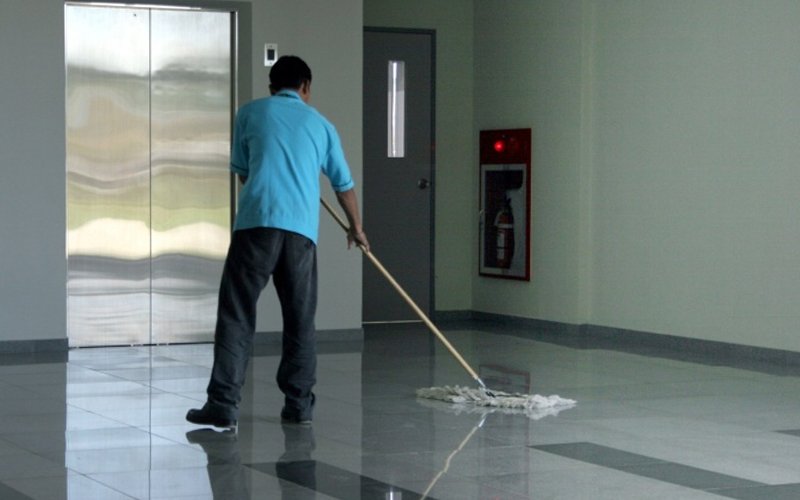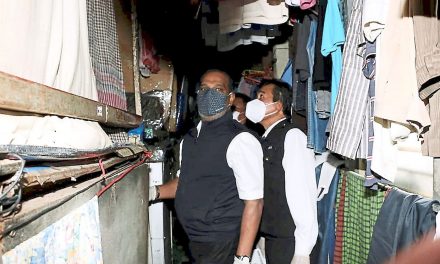KUALA LUMPUR | For more than a decade, Thangarani Karupiah had been making just RM900 a month from her job sweeping and mopping floors at a private healthcare centre near the capital.
But since 2019, she has benefited from government rules on wage floors, and now pulls in RM1,200.
She is among 1.2 million Malaysians who will benefit again when the minimum wage goes to RM1,500 next month, up from the current RM1,100 or RM1,200 in 57 major cities, according to the government.
The new floors represent a windfall of 25% to 35% for the many workers who live paycheck to paycheck.
“If there were no rules set by the government, I would still be paid RM900,” Thangarani, who has been in her job for 23 years, told Nikkei Asia.
The government is lifting the minimum wage again to support people suffering from economic pain inflicted first by the pandemic then aggravated by Russia’s invasion of Ukraine.
The salve of fatter paychecks, however, could erode corporate profits and investment appetites, ultimately slowing the country’s recovery from the pandemic, experts fear.
Overseers of industries, many of which are still being roiled by the pandemic’s lingering economic turbulence, disparage the latest revision as “abrupt” and “disruptive.”
Syed Hussain Syed Husman, president of the Malaysian Employers Federation, told Nikkei Asia in a recent interview that the “MEF is of the view that the increase in minimum wage rates is too steep and would add to the challenges that private-sector employers face. Furthermore, the higher minimum wage might further disrupt an economy still striving to put itself on the recovery track”.
Besides Covid-19 and the social restrictions it wrought, Syed Hussain noted that some Malaysian businesses were also trying to come back from devastating floods. Super Typhoon Rai, which hit the Philippines and Malaysia last December unleashed severe flash floods in Malaysia, affecting eight states, including Kuala Lumpur and Selangor, killing 55 people and displacing almost 100,000.
Many experts say they detect a clear political motive behind the decision to raise the minimum wage: The government led by Prime Minister Ismail Sabri Yaakob expects general elections to take place by the end of the year.
The government, however, pooh-poohs the notion of vote-buying, saying it wants to raise the minimum wage to give Malaysians a leg up as they climb back economically from the pandemic.
Human resources minister M Saravanan told Nikkei that the RM1,500 minimum wage was indeed timely and companies should have anticipated such a move as, according to the law, the pay floor must be reviewed at least once every two years.
The decision, Saravanan said, was made after several factors were considered, namely the increase in poverty line income, cost of living trends and the inflation picture. The Wage Subsidy Programme, designed to help businesses mitigate the economic impact from the pandemic, and other initiatives, have also been taken into consideration.
“Bear in mind,” Saravanan said, “that workers have been badly affected during the pandemic. Some of them had their wages cut. Others were told not to come to work or had their hours reduced, which affected their salaries.”
The median monthly salary in 2020 dropped 13% to RM1,894 from RM2,185 in 2019, according to human resources ministry data. “The increase in the minimum wage is expected to restabilise the wages” of workers at the bottom of the payscale, Saravanan added.
The minimum wage first became the stuff of campaign promises in 2018, when pledges to raise the floor attracted principally working-class voters to Pakatan Harapan led by Dr Mahathir Mohamad. Before that, the minimum wage had only been revised once, in 2016, after the National Wages Act took effect in July 2012.
In its 2018 general election manifesto, PH, then the opposition coalition, promised to increase the minimum wage to RM1,500 within the five-year administrative term. The coalition stormed to power but was unseated less than two years later due to internal conflict. During its 22 months behind the wheel, the Mahathir-led government only managed to raise the minimum wage to RM1,200 in major cities.
Malaysia’s central bank has warned that the revised minimum wage policy should be implemented in an orderly fashion so that it supports economic growth and does not add to inflationary pressures.
“The implementation of the minimum wage increase would need to account for the uneven recovery across industries,” Bank Negara governor Nor Shamsiah Mohd Yunus said during a recent news conference.
Nor Shamsiah added that any disruption must be minimised. “On this front,” she said, “we should give some time for effective firms to adjust. (Towards this end), the phased approach as announced by the government would help.”
She also voiced worry that over time the phased approach could distort the job market by incentivising workers to change jobs for higher pay. She called for minimising any such consequence.
Yeah Kim Leng, an economics professor at Sunway University, said the steep increase could weaken Malaysia’s nascent economic recovery. He said the increase was ill-timed, given rising external risks to growth emanating from the ongoing war in Ukraine, sanctions on Russia, lockdowns in China and monetary tightening in the US.
The fact that wage growth in Malaysia has been slower than in other Asian nations over the past 10 years may justify the sharp rise in the minimum wage.
Over the past decade, the average wage at factories that spin out goods for Japanese companies has grown more slowly in Malaysia than elsewhere in Southeast Asia. This is partly because Malaysian wages are relatively high compared with the region’s other emerging economies such as Vietnam.
Takenobu Yamashiro, deputy director of the government-affiliated Japan External Trade Organization (Jetro), said there was more at work here.
“Since 2013, Malaysia has had a policy of reviewing the minimum wage nearly every two years,” he said. “That is less frequently than in Indonesia and other countries that conduct reviews once a year. It is the policy differences that make the overall growth rate rather gentle.”
Southeast Asian policymakers have other worries. Russia’s invasion of Ukraine has sent oil and food prices soaring, a trend that has been especially injurious to the region’s economies, which are still reeling from the pandemic. Now, taming inflation and stabilising prices have become top priorities for politicians, who know high everyday costs could jeopardise their jobs, regardless of the political system.
In Indonesia, Jakarta governor Anies Baswedan on Jan 1 raised the capital’s minimum monthly wage by 5% to 4.6 million rupiah, almost five times the national average of 1.09% set by the ministry of manpower.
Some critics suspect the big increase is a ploy to help Baswedan realise his presidential ambitions.
“Do business owners see [Jakarta’s hike] related to a political interest? Obviously,” Adi Mahfudz Wuhadji, deputy chairman of the Indonesian Employers Association, told a news conference in December.
“Anies made a one-sided [decision] … when minimum wages should be decided together” by the government, labour unions and employers, he said, adding that the impact on businesses would be “extraordinary”.
Baswedan has become one of Indonesia’s most prominent presidential aspirants. In a poll conducted in February by Saiful Mujani Research and Consulting, Baswedan finished as the second-most-popular potential candidate among those listed.
President Joko “Jokowi” Widodo also dished out a big minimum wage hike when he was Jakarta governor, in 2013. His was a doozy. Amid widespread labour rallies and strikes, then-governor Widodo announced a 44% minimum wage increase, to 2.2 million rupiah. At the time and afterward, most minimum wage hikes were in the single digits.
Widodo’s stunner was also perceived as a ploy to smooth his way to the presidency. He ran for that office the following year, trumpeting the capital’s happier paydays during his successful campaign.
With Southeast Asia’s economies primed to recover from the pandemic and its various restrictions, the region’s leaders find themselves pinned in. Russia’s war on Ukraine is dragging their economies back down. It is also forcing politicians to find common ground between workers, who desperately need more pay, and business owners, who prefer not to tinker with the parameters of capitalism that have allowed them to amass their fortunes.
The International Monetary Fund on April 19 announced a lower growth forecast for Asia’s emerging economies, 5.4%. It had been expecting these economies to grow at a 5.9% clip this year.
Singapore is going its own way when it comes to the minimum wage. It does not officially have a blanket minimum that covers all sectors. Instead, the government has opted to set base pay amounts for specific, typically low-salaried jobs like cleaners and security guards. It also uses what it calls the “progressive wage model,” which allows a worker’s minimum earnings to rise as the employee undergoes skills training, takes on heavier responsibilities through promotions and otherwise performs at a higher level.
Over the next two years, the policy will be gradually extended to cover more low-paying sectors like retail and food services. In addition, a rule will take effect in September requiring companies that want to hire foreign workers to pay Singaporean staff at least a “local qualifying salary,” set at SG$1,400 – a base wage that is set to rise in the future.
“Our overarching principle continues to be that wages and productivity should rise in tandem,” Zaqy Mohamad, the senior minister of state for manpower, told Parliament in March. “We not only want wages to rise, but we also want productivity to increase, through upskilling workers, and through the transformation of businesses.”
In Indonesia, the government this month announced a “wage subsidy,” a response of sorts to rising prices. Under the latest policy, 8.8 million workers who earn less than 3.5 million rupiah a month will receive a one-off handout of 1 million rupiah.
Labour unions turned a cold shoulder to the cash payments. “We call them a bribe, meant to make people stop criticising the many bad government policies these days,” said Nining Elitos, chairwoman of the Indonesian Labour Union Alliance Congress. Elitos cited the sweeping omnibus law that passed in late 2020 and which many labour unions have blamed for unfavourably impacting minimum wages.
“The government should provide welfare to the people through income certainty,” Elitos told Nikkei. “Regarding wages, the government should control and intervene in the market, otherwise there will be a ruckus every year.”
Single-party Vietnam plans to raise its minimum wage by 6% in July. It will be the first such hike in two years. “This change in minimal wage hopefully will ensure the livelihoods of most workers,” said Le Van Thanh, deputy minister of labour, invalids and social affairs, as quoted in the government’s Vietnam News. “The increase is not high, but it (is in harmony with) the will of the employees and the employers.”
Thailand, meanwhile, is planning to raise its minimum wage in September to “an appropriate sum” that is in line with the recovering economy.
Analysts and businesses argue that the timing might not be right for a minimum wage hike as the Thai economy has not fully recovered from the pandemic.
“The employment rate is not yet recovered,” said Tanit Sorat, vice chairman of the Employers’ Confederation of Thai Trade and Industry. “And unemployment remains high. It might not be the right time to raise the minimum wage, at least not too much.”









